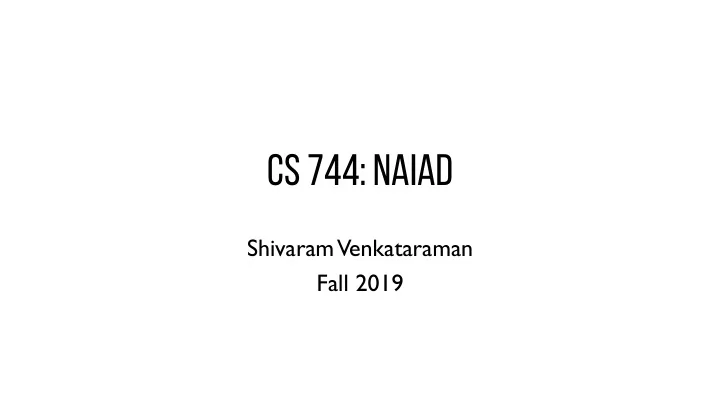

CS 744: NAIAD Shivaram Venkataraman Fall 2019
ADMINISTRIVIA - Course Project Proposal feedback - Midterm grades - Checkins?
Applications Machine Learning SQL Streaming Graph Computational Engines Scalable Storage Systems Resource Management Datacenter Architecture
DASHBOARDS
Streaming + ITERATIVE COMPUTATION
TIMELY DATAFLOW
TIMELY DATAFLOW
VERTEX API Receiving Messages v.OnRecv(e : Edge, m : Msg, t : Time) v.OnNotify(t : Timestamp) Sending Messages this.SendBy(e : Edge, m : Msg, t : Time) this.NotifyAt(t : Timestamp)
IMPLEMENTING TIMELY DATAFLOW Need to track when it is safe to notify Path Summary Check if (t 1 ,l 1 ) could-result-in (t 2 ,l 2 ) Scheduler Occurrence and Precursor count Precursor count = 0 à Frontier
ARCHITECHTURE Workers communicate using Shared Queue Batch messages delivered Account for cycles Vertex single threaded
DISTRIBUTED PROGRESS TRACKING Broadcast-based approach Maintain local precursor count, occurrence count Send progress update (p ∈ Pointstamp, δ ∈ Z) Local frontier tracks global frontier Optimizations Batch updates and broadcast Use projected timestamps from logical graph
FAULT TOLERANCE Checkpoint Restore Log data as computation goes on Reset all workers to checkpoint Write a full checkpoint on demand Reconstruct state Pause worker threads Resume execution Flush message queues OnRecv
MICRO STRAGGLERS What is different from stragglers in MapReduce? Sources of stragglers Network Concurrency Garbage Collection
Differential DATAFLOW // 1a. Define input stages for the dataflow. var input = controller.NewInput<string>(); // 1b. Define the timely dataflow graph. // Here, we use LINQ to implement MapReduce. var result = input.SelectMany(y => map(y)) .GroupBy(y => key(y), (k, vs) => reduce(k, vs)); // 1c. Define output callbacks for each epoch result.Subscribe(result => { ... }); // 2. Supply input data to the query. input.OnNext(/* 1st epoch data */); input.OnCompleted();
SUMMARY Stream processing à Increasingly important workload trend Timely dataflow: Principled approach to model batch, streaming together Vertex message model - Compute frontier - Distributed progress tracking
DISCUSSION https://forms.gle/v3YsW1HvnqsxCuPu5
What are some example scenarios discussed in the dataflow paper that are NOT a good fit for implementation using Naiad?
Consider you are implementing a micro-batch streaming API on top of Apache Spark. What are some of the bottlenecks/challenges you might have in building such a system?
Recommend
More recommend